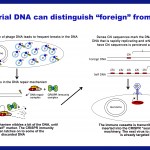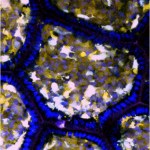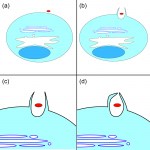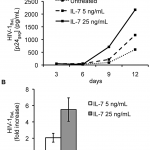Immune system
Foreigner or native-born? Your immune system discriminates between them, as do those of bacteria. Yes indeed, bacteria do have immune systems – pretty complex ones at that. And like any useful immune system, the bacterial ones must have a good technique for distinguishing “foreign” from “self.”
You may even have heard of the bacterial immune system: It’s called CRISPR, and it’s used in biology research around the world for DNA engineering and genome editing. CRISPR normally inserts short DNA sequences taken from phages – viruses that invade bacteria – into special slots called spacers within…
In a phenomenon known as Peto's paradox, large mammals do not develop cancer more often than small mammals, despite having more cells that could go haywire. On Life Lines, Dr. Dolittle writes "Some researchers suggested that perhaps smaller animals developed more oxidative stress as a result of having higher metabolisms. Others proposed that perhaps larger animals have more genes that suppress tumors." But a new hypothesis argues that large mammals have evolved to minimize the activity of ERVs, which are ancient viral elements integrated into our DNA. Active ERVs can cause cancer and possibly…
Every time I see an ad for some remedy that "Helps BOOST the Immune System!" I die a little inside. It's not just that these products are often homeopathic bull*, but (as I've mentioned before), boosting the immune system can actually be a terrible idea. The immune system is a finely tuned instrument, and too much can be just as bad too little. Too much immune activation leads to allergies and autoimmune disorders like multiple sclerosis (MS) or lupus. We don't know exactly why, but the prevalence of these "hyperinflammtory disorders," where the immune system is over-…
Poetry is finding its way into our consciousness at the Weizmann Institute: At the recent, fourth annual Science on Tap evening, which the Institute hosts in Tel Aviv, several poets joined in the fun, reading from their work before and after the talks given by scientists in over 60 filled-to-capacity pubs and cafes around the city. And calls have gone out for entries to the Ofer Lider creative writing contest – open to scientists (writing in Hebrew). The contest is named for Prof. Ofer Lider, an Institute scientist who, sadly, died young and who wrote poetry because he believed that…
For this week's OAS Wednesday, I thought I'd try to highlight some research that's in my field. As a result, I will likely be more prone than usual to lapsing into jargon and assuming knowledge that I shouldn't (or maybe I'll over-correct and get too simplified). Please let me know if anything needs clarification.
In real estate, they say that the three most important things to consider are location, location and location. The same could probably be said about many aspects of biology, including the immune system - if you get a cut on your toe, you don't want inflammation in your kidney.…
One of the things that bugs me most in pop-sci and woo-woo science is the obsession with "boosting" the immune system. The immune system is in a constant balancing act - tip it too far one way and even normally harmless bacteria become life-threatening. But tilt it too far in the other direction, and you can end up with things like allergies and autoimmunity. And some pathogens have learned to take advantage of your normal immune responses, meaning that "boosting" your immune system can sometimes do more harm than good. A good case-in-point is a recent paper published in PLoS Pathogens:
IL-7…
A "potentially historic" blizzard is barreling down on us here in New England, and is poised to drop up to two feet of snow on Boston. All of the schools in the area preemptively closed, our public transit system is shutting down at 3:30pm, and trying to buy groceries last night was bedlam. The snow is just now beginning to fall. Winter in New England can be rough, especially for a California-raised boy like me. It's not just because of the snow and cold, it's also the influenza and common colds.
Source - Flickr user "Placbo"
The fact that the rate of some infections can vary by…
[This question was originally asked on www.reddit.com/r/askscience on Jan 17, 2013]
Why do microorganisms only begin breaking down our tissues after death? What stops them from doing so whilst we are still alive?
The main reason is that our body maintains a multitude of barriers that largely prevent bacteria and other microorganisms from gaining entry. The first and most obvious of these barriers is the skin, but there are also similar barriers along all of your mucosal surfaces (gut, ear, genital tract etc). These barriers consist of cells that are knit together incredibly tightly (google:…
There are a lot of reasons that posts to this blog sometimes don't happen for months at a time, but one of them is that I can often get sucked down the rabbit hole that is Reddit. If you don't know about reddit yet, you may not want to click that link, but if you do know (and you're reading this blog), you may know about one of the communities (subreddits) there - a place called r/askscience. It's a forum where people can ask questions of a scientific nature (anything from "Why are pigeons so successful as an urban animal?" to "What's so special about the speed of light?"), and then actual…
In case you missed it, over the past couple of days there have been reports of an outbreak of Ebola hemorrhagic fever virus in Uganda. As of this writing, the most recent report I've seen puts the death toll at 16, with a few other suspected cases. Ebola is terrifying for a number of reasons - it's readily transmissible, it has a remarkably high and rapid lethality (25-90% case fatality rate within days to weeks), and the way it kills is gruesome - causing massive bleeding from all orifices. There's no vaccine or cure.
The good news from an epidemiology standpoint…
The vast majority of funding for biological research in the US comes from the National Institutes of Health (NIH), and as a result, most of our grants are written in a way that plays up the clinical importance of our work. Some variant of the phrase,
This research has implications in the treatment/prevention of [insert disease here]...
appears in just about every grant and research paper in my field. In truth, it's often very difficult to draw a direct line between a specific research project and a drug that your doctor can prescribe. We like to pretend that we can leverage research to…
In honor of the great Scienceblogs migration, and inspired by Ethan's wonderful post about the migration of the universe, I thought I would talk about something on a smaller scale: cell migration.
The scale is small, but the problem is huge. Most of your organs are locked in place - your heart never needs to be in your thigh - but the immune system has to be everywhere. When you cut your toe, breathe a virus into your lungs or eat a piece of contaminated spinach, the immune system needs to be johnny-on-the-spot with the inflammatory response.
Thankfully, there's already an organ system that…
I know something's amiss when my google news alert returns headlines like these:
Why women who lust after Brad Pitt may just fancy his immune system
It's His Immune System That You Actually Want to Sleep With
The key to male sexiness: A powerful immune system?
and my personal favorite
Antibodies, Not Hard Bodies: The Real Reason Women Drool Over Brad Pitt
These snazy headlines are all pointing to a recent paper in Nature Communications. The paper's methodology is pretty simple: They took 74 Latvian men and immunized them against Hepatitis B. Later, they measured the participants' blood for…
I promise, this will be my last semen post for a while.
I've talked about allergy to semen.
I've talked about allergens in semen.
And I've talked about autoimmunity to semen.
All of these are problems, leading to discomfort or infertility. But what if those problems could be leveraged for our benefit?
[Source: These drawings were made by Antonie von Leeuwenhoek - the first man to view sperm cells under a microscope]
Using the immune system as a contraceptive is not a new idea. In 1899, Karl Landsteiner
and Elie Metchnikoff (both of whom would later win Nobel Prizes) independently…
This entry is cross posted from the the SITN Flash, a bimonthly publication written and edited by Harvard graduate students. You can find my piece, as well as archives of previous articles written by many graduate students at the Science in the News website.
In 1985, the Centers for Disease Control (CDC) began tracking the prevalence of obesity in the United States. Since then, a clear trend has emerged: obesity is on the rise. The maps below compare obesity levels across the United States in 2004 and 2008:
It's clear that the number of people with obesity is growing, and has been as long we…
One of my favorite places on the internet is r/askscience, a place on reddit where people come and ask questions, and a panel of scientists answer. People can ask follow-up questions, and there is often some great back-and forth (to be honest, part of the reason I haven't been writing as much here is because I'm using up all my time over there). Recently, an number of people have been asking questions about allergies - Can people grow out of allergies? Why is the incidence of allergies increasing? Can eating honey cure allergies?
You can check out those threads if you want answers to those…
While researching my recent post on the Nobel Prize, I discovered that the website has a series of "educational productions," including games and written/illustrated primers on different topics. I've been playing the malaria game all morning - you have to fly a mosquito around drinking the blood of humans while avoiding bug spray and mosquito nets and birds, but first you get a little lesson telling you about how malaria is transmitted.
Or play immune system defender where general macrophage teaches you how to hunt down the nefarious bacterial invaders.
The written articles are pretty good…
I took my first immunology class at UCSD in the spring of 2004. I've always been interested in signaling (how cells take information from the outside and translate that to the inside) but the subject matter of this class was set to disappoint - in terms of signaling, it more or less stopped at the outer membrane of cells. Even though looking back, I can see now that a subject as vast as immunology has to cut some corners in a 10 week course, early on that quarter I was a bit frustrated. But just before the first midterm, we started learning about one of the most bizarre behaviors of cells…
The field of immunology has a few quirks. I'm sure this is no different than other fields of study, but one of the most puzzling (and sometimes infuriating) of these quirks is an obsession with categorizing different types of cells. Case in point, a recent paper in Nature Immunology:
A semi-invariant Vα10+ T cell antigen receptor defines a population of natural killer T cells with distinct glycolipid antigen-recognition properties
But before I get into that, allow me to provide some back-story.
Identifying Cells
First, I should be clear, immunology isn't alone in trying to delineate…
Abbie over at ERV has a really great summary of a new Nature Medicine paper, in which the authors managed to turn a mouse's immune system against prostate tumors by infecting them with viruses engineered to express prostate proteins. Some of the results struck her as a bit counterintuitive, but I thought of some possible explanations. I was going to leave this as a comment on her blog, but the more I read the paper, the more stuff bubbled up, and I though it deserved a full post. Go read Abbie's post first though, or this probably won't make much sense.
Admittedly speculative explanations to…













